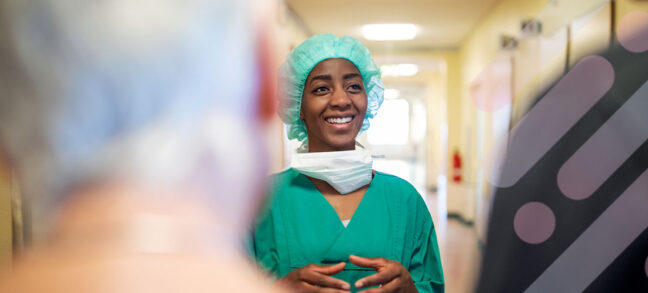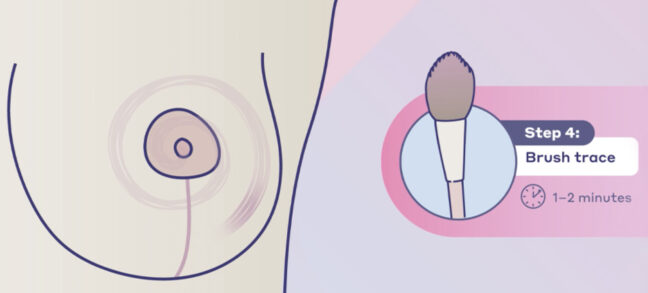In 2018, Elizabeth Chestnut was diagnosed with breast cancer and elected to have a double mastectomy. Her story is a poignant reminder of what can be gained when women choose Resensation. It’s also a powerful example of how women need to advocate for themselves at every step of their reconstruction journey.
you control your story
Elizabeth has been a women’s health nurse for nearly 25 years. In 2013, during a routine mammogram, her doctor found some irregular cells. She underwent a lumpectomy to remove them. Five years later, at age 45, the cancer came back. She was diagnosed with Ductal Carcinoma in Situ (DCIS). Her doctor recommended radiation and further treatment. Elizabeth wanted to take a different approach. One that meant she wouldn’t have to deal with any of this again. She told her doctor she wanted a bilateral breast mastectomy.

get a second opinion
As a nurse and OB GYN case manager, Elizabeth was used to advocating for other patients, which made advocating for herself easier. So when her doctor didn’t like the idea of a bilateral breast mastectomy, Elizabeth wasn’t afraid to push back. She had calculated her risk for breast cancer recurrence, and she felt it was the right route for her.
Elizabeth advises women not to feel pressured to go with the first doctor they see. If you want something your doctor isn’t willing to offer or doesn’t agree with, speak up. Seek a second opinion.
do your research
Women are commonly told to get all the information they can. “Talk to other patients who go to the physician you’re going to. Look at their results. Learn about all your options. Don’t just do what they tell you to do. You need to take a little time and do your research,” Chestnut says.
Elizabeth’s own research helped her find a plastic surgeon, Dr. Richard Kline, at the Center for Natural Breast Reconstruction in Mount Pleasant, South Carolina. Dr. Kline helped Elizabeth understand all her options. She asked to see his work so she could compare DIEP-flap reconstruction outcomes against breast implants. As Elizabeth notes, that first appointment can feel overwhelming. Like many women at that point, she wasn’t yet in the right mindset to think about or discuss Resensation.
take initiative
Elizabeth was already aware of the possibility of numbness after a mastectomy, but she didn’t know about Resensation, a surgical technique designed to restore sensation, until she saw a pamphlet in Dr. Kline’s waiting room. She took it home and read it. Afterward, she hopped online, gathered more facts and then excitedly emailed her surgeon to go in and discuss it as an option.
“It got me excited that it [Resensation] really was a possibility. Once I read about it, it’s all that stayed in my mind,” she says.
demand better communication
After discussing Resensation with her surgeon, Elizabeth knew it was right for her. She felt so strongly about it that she spent a few hours on the phone with her insurance company, the hospital and her doctor’s office to ensure everything was good to go. For Elizabeth, her persistence paid off and advocating for herself made all the difference.
think long-term
Elizabeth believes having sensation restored during reconstruction should be your right as a woman. You have sensation before a mastectomy, why should you not expect it after if there is an option that makes it possible? While it might not be the appropriate choice for everyone, she encourages women to “always think down the road before you decide. Take your time. It is going to be important to you. It may not be right now because all you’re focusing on is the cancer diagnosis. But think long-term. Don’t make a quick decision. It’s going to affect your quality of life, how you interact with your family, friends, and the world around you. It will impact your whole life.”
It’s hard to know how numbness in your chest will really feel until it happens. After her surgery, Elizabeth was surprised by the sense of loss it evoked. “It was kind of like grieving something,” she says.
Today, after having Resensation included in her reconstruction, she’s happy to report she has nearly all feeling back in both breasts. “I’m back to normal. Having sensation has really impacted how I feel about my body and how I feel about myself. It’s increased my self-esteem, my self-confidence and my quality of life. I’m back to normal. I’m whole again. There’s nothing missing.”
Resensation Articles

How does mastectomy impact the nerves in the breast?
One sometimes overlooked aspect of mastectomy is its impact on nerves. Read what happens to nerves during mastectomy and explore…
Read More
What happens during implant breast reconstruction with Resensation®?
By repairing sensory nerves, Resensation® enables you to potentially regain sensation to your chest. Read how this procedure works during…
Read More
how resensation® helped Leanna feel secure in her family’s future
With Resensation®, Leanna can be there to watch her kids grow up—without losing the feeling of being whole.
Read More
post-surgery sensory retraining: instructions and video guide
Sensory retraining is a series of exercises designed to help you reconnect with your body after breast reconstruction with Resensation®.
Read More